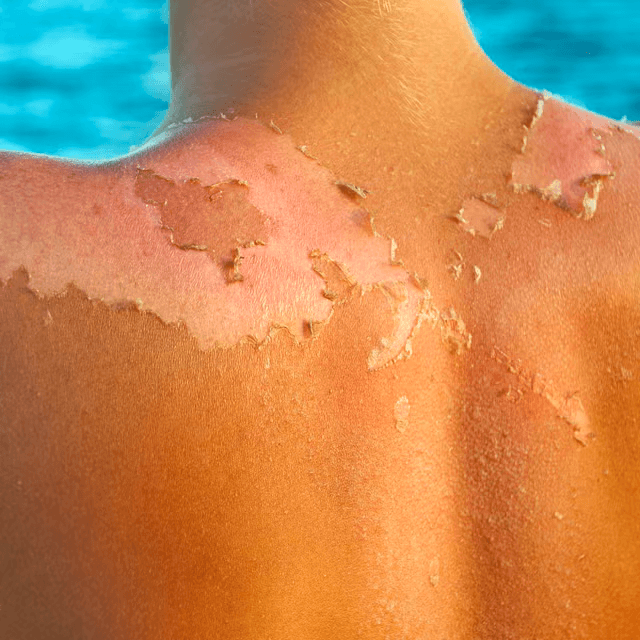
Sunburn is a common but preventable skin condition caused by prolonged exposure to ultraviolet (UV) radiation from the sun. While a tan might seem appealing, the damage UV rays do to your skin can lead to lasting health risks. At our private GP clinic, we specialize in expert skin care, providing both immediate treatment for sunburn and advice on how to protect your skin from future harm.
What is Sunburn?
Sunburn happens when your skin is overexposed to UV rays. The skin becomes inflamed, red, and painful, and severe cases can lead to blisters and peeling. Repeated sunburns can accelerate skin aging and increase your risk of skin cancer. Protecting your skin is crucial, and knowing how to treat and prevent sunburn can help keep your skin healthy.
Signs and Symptoms of Sunburn
The effects of sunburn can appear within hours of exposure to the sun. Common signs include:
- Redness: The skin turns red and feels warm to the touch.
- Pain: Sunburned skin is tender, sensitive, and sometimes painful.
- Swelling: In more severe cases, the skin may swell.
- Blisters: Severe sunburn can cause painful blisters to form.
- Peeling: After a few days, the skin may start to peel as it heals.
If you notice any of these symptoms, it’s important to treat your skin properly to minimize further damage.
Who is at Risk for Sunburn?
Certain individuals are more vulnerable to the harmful effects of the sun. At our private GP clinic, we often see patients who are at a higher risk, including:
- Fair-skinned individuals: People with light skin and lighter eye colors have less melanin, offering less natural protection against UV radiation.
- Children: Children’s skin is more sensitive, which makes them more prone to sunburn.
- People with a history of sunburn: If you’ve experienced multiple sunburns, your skin is more likely to suffer damage in the future.
- Outdoor workers or athletes: Those who spend significant time outdoors during peak sun hours (typically 10 am – 4 pm) are more likely to develop sunburn.
- Certain medications: Some medications increase sensitivity to sunlight, making you more susceptible to sunburn.
How to Treat Sunburn
If you’ve been sunburned, there are several steps you can take to soothe your skin and promote healing:
- Cool your skin: Take a cool bath or shower to help bring down your body temperature. Avoid hot water, as it can irritate your skin.
- Moisturize: Apply aloe vera or a gentle, alcohol-free moisturizer to hydrate your skin and prevent further dryness or peeling.
- Hydrate: Drink plenty of water to rehydrate your body and support your skin’s healing process.
- Pain relief: Over-the-counter anti-inflammatory medications like ibuprofen or aspirin can help reduce swelling and alleviate discomfort.
- Rest: Avoid further sun exposure while your skin recovers, and allow your body time to heal.
At our private GP clinic, we offer professional consultations to help treat more severe sunburns and manage pain, swelling, and skin irritation. Our team is here to support your recovery and help you find the best skincare routine moving forward.
How to Prevent Sunburn
Preventing sunburn is much easier than treating it. Here’s how to protect your skin:
- Use sunscreen: Apply a broad-spectrum sunscreen with SPF 30 or higher. Be sure to reapply every two hours, and after swimming or sweating.
- Wear protective clothing: Choose lightweight, long-sleeved shirts, hats, and sunglasses to shield your skin from UV rays.
- Seek shade: Avoid direct sun exposure during peak UV hours (typically from 10 am to 4 pm).
- Avoid tanning: Skip tanning beds and prolonged sun exposure. Over time, this can cause long-term damage to your skin.
Complications of Sunburn
While sunburn may seem like a temporary issue, it can lead to long-term complications, including:
- Premature aging: UV exposure accelerates skin aging, causing wrinkles, age spots, and sagging.
- Skin cancer: Repeated sunburns increase your risk of developing skin cancer, including melanoma, the deadliest form.
- Eye damage: UV rays can also affect your eyes, contributing to conditions like cataracts and macular degeneration.
At our private GP clinic, we provide thorough skin assessments and advice on how to protect your skin from UV damage. If you have concerns about previous sunburns or are noticing changes in your skin, we offer personalized care and support.
When to Seek Professional Help
If your sunburn is severe, or if you experience symptoms like blisters, fever, or dizziness, it’s important to seek medical advice. At OneMedicine, we can assess the severity of your sunburn and provide the appropriate treatment. We’re also here to help you manage long-term skin health to minimize future risks.
Get Expert Care at Our Private GP Clinic
If you’re looking for expert advice on sunburn treatment or prevention, our team is here to help. With personalized consultations and skincare recommendations, we ensure that your skin stays healthy, protected, and rejuvenated. Contact us today to book an appointment and get the care you deserve.
















